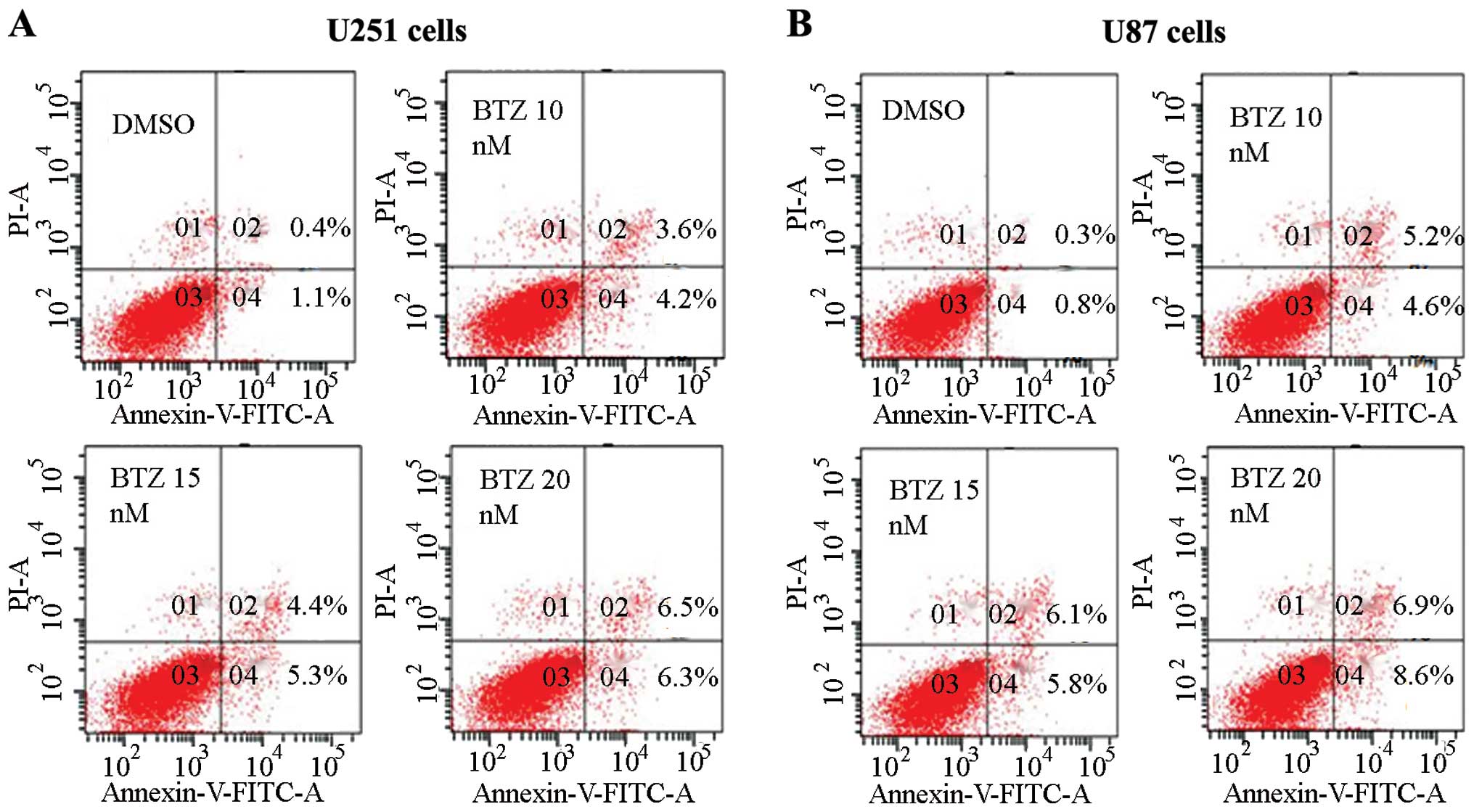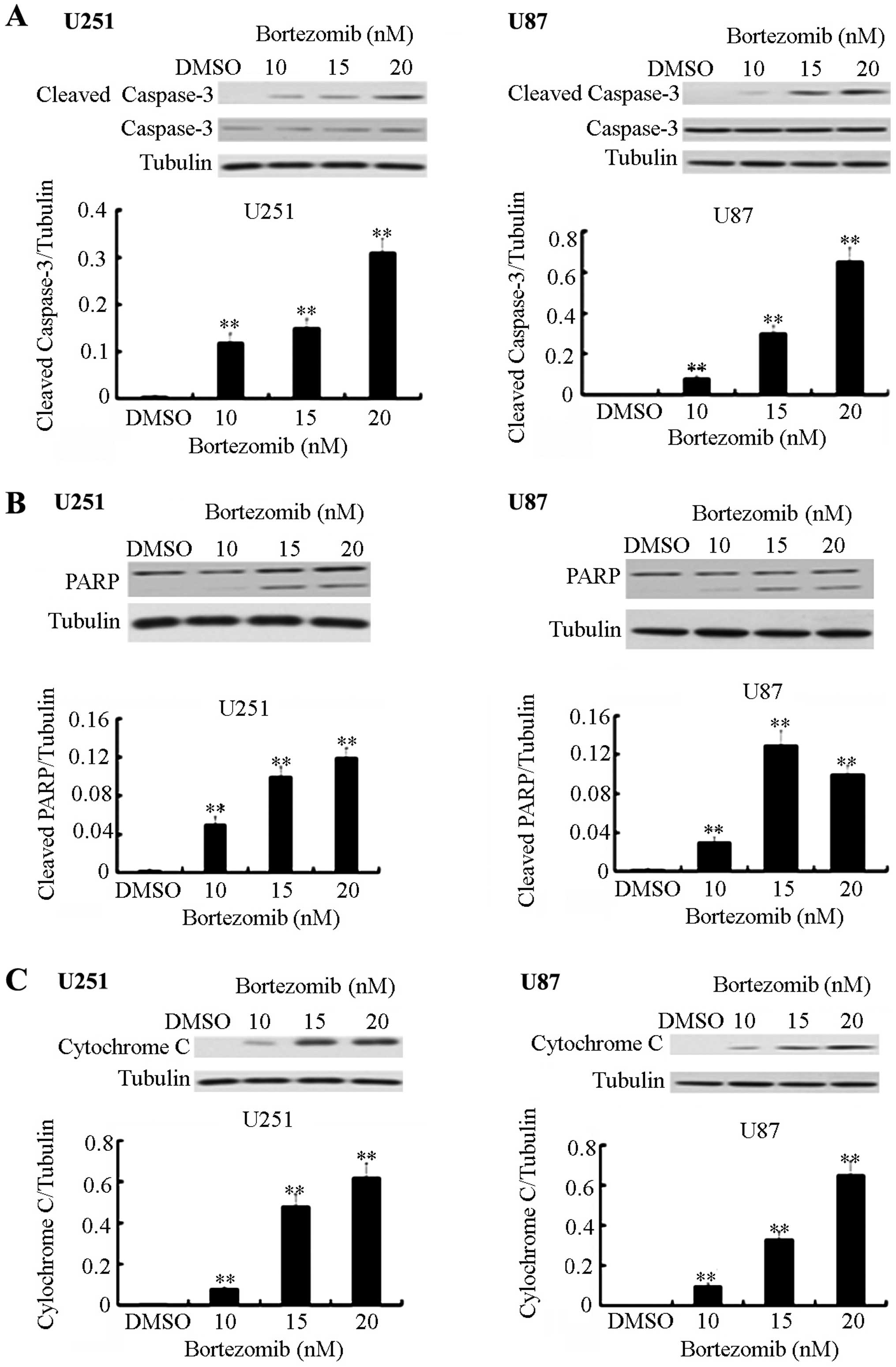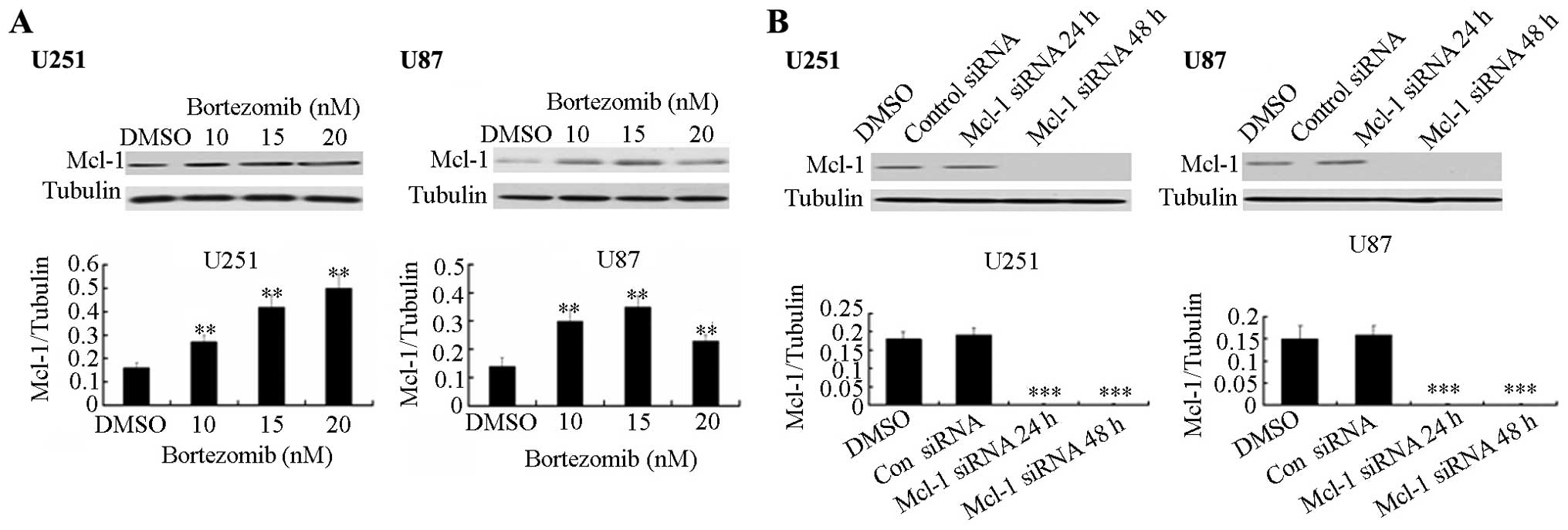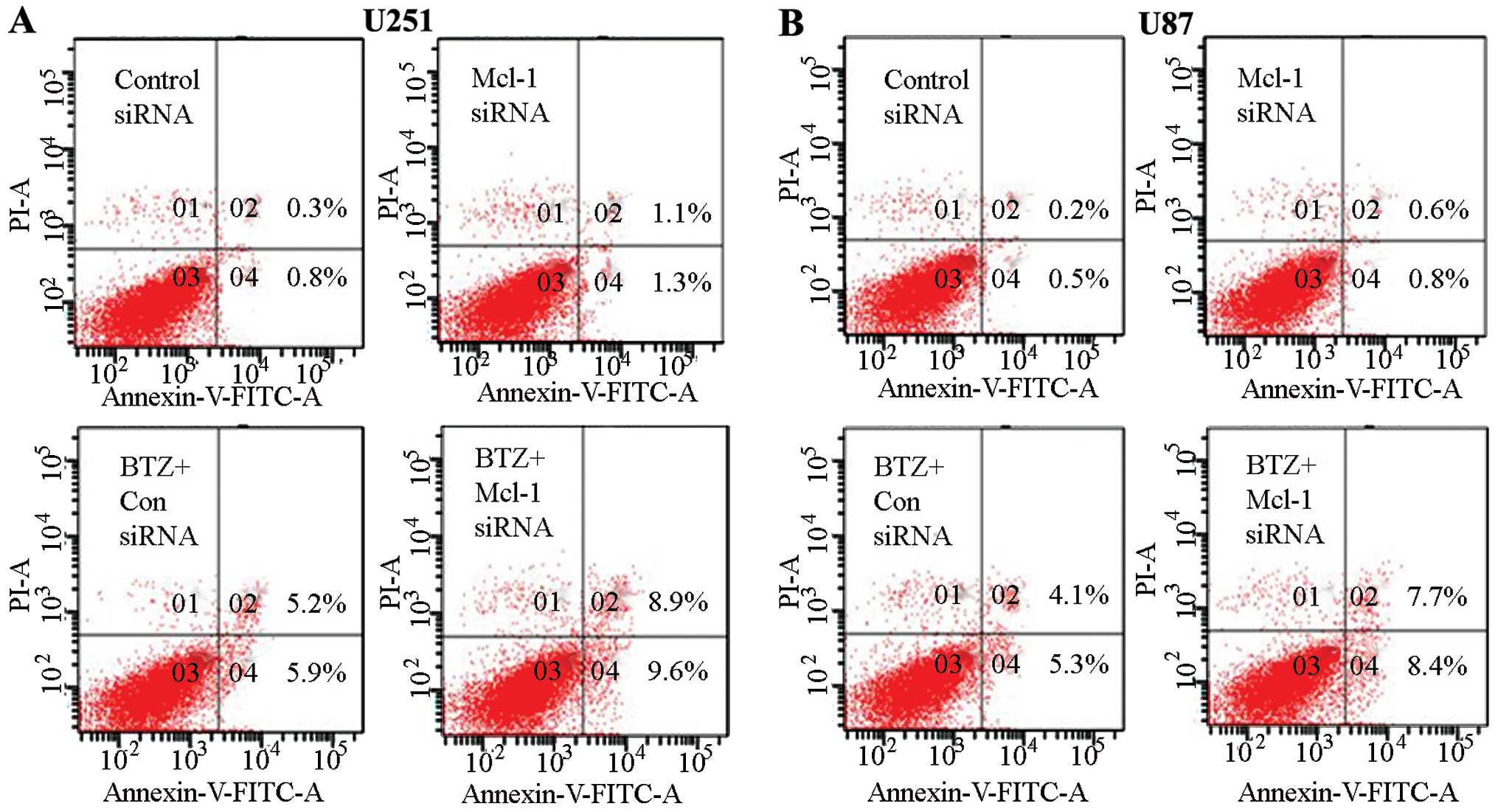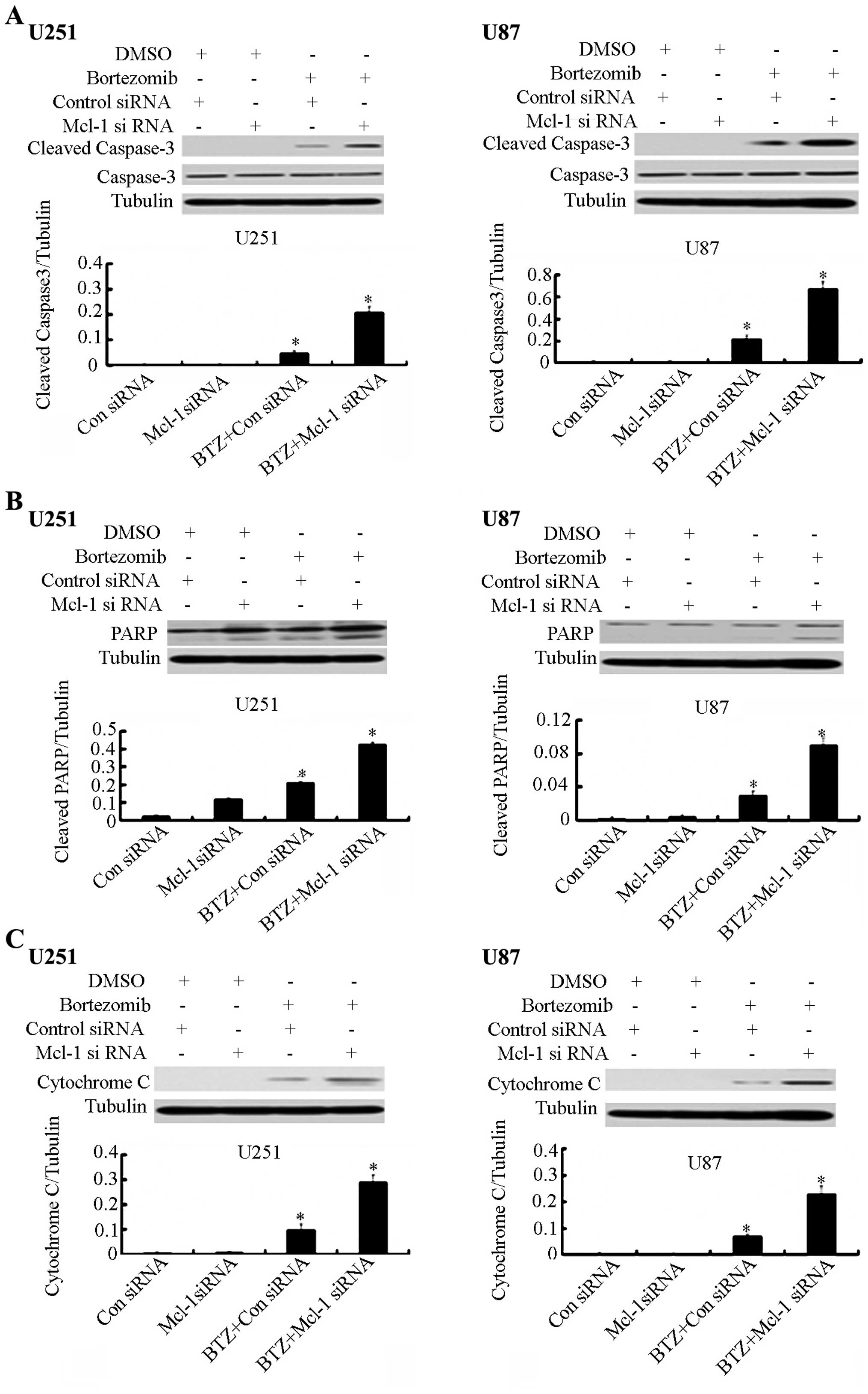|
1
|
Gomez-Bougie P, Wuillème-Toumi S, Ménoret
E, Trichet V, Robillard N, Philippe M, Bataille R and Amiot M: Noxa
up-regulation and Mcl-1 cleavage are associated to apoptosis
induction by bortezomib in multiple myeloma. Cancer Res.
67:5418–5424. 2007. View Article : Google Scholar : PubMed/NCBI
|
|
2
|
Chen D, Frezza M, Schmitt S, Kanwar J and
Dou QP: Bortezomib as the first proteasome inhibitor anticancer
drug: Current status and future perspectives. Curr Cancer Drug
Targets. 11:239–253. 2011. View Article : Google Scholar : PubMed/NCBI
|
|
3
|
Lesinski GB, Raig ET, Guenterberg K, Brown
L, Go MR, Shah NN, Lewis A, Quimper M, Hade E, Young G, et al:
IFN-alpha and bortezomib overcome Bcl-2 and Mcl-1 overexpression in
melanoma cells by stimulating the extrinsic pathway of apoptosis.
Cancer Res. 68:8351–8360. 2008. View Article : Google Scholar : PubMed/NCBI
|
|
4
|
Kane RC, Dagher R, Farrell A, Ko CW,
Sridhara R, Justice R and Pazdur R: Bortezomib for the treatment of
mantle cell lymphoma. Clin Cancer Res. 13:5291–5294. 2007.
View Article : Google Scholar : PubMed/NCBI
|
|
5
|
Orlowski RZ, Eswara JR, Lafond-Walker A,
Grever MR, Orlowski M and Dang CV: Tumor growth inhibition induced
in a murine model of human Burkitt’s lymphoma by a proteasome
inhibitor. Cancer Res. 58:4342–4348. 1998.PubMed/NCBI
|
|
6
|
Fisher RI, Bernstein SH, Kahl BS,
Djulbegovic B, Robertson MJ, de Vos S, Epner E, Krishnan A, Leonard
JP, Lonial S, et al: Multicenter phase II study of bortezomib in
patients with relapsed or refractory mantle cell lymphoma. J Clin
Oncol. 24:4867–4874. 2006. View Article : Google Scholar : PubMed/NCBI
|
|
7
|
Fanucchi MP, Fossella FV, Belt R, Natale
R, Fidias P, Carbone DP, Govindan R, Raez LE, Robert F, Ribeiro M,
et al: Randomized phase II study of bortezomib alone and bortezomib
in combination with docetaxel in previously treated advanced
non-small-cell lung cancer. J Clin Oncol. 24:5025–5033. 2006.
View Article : Google Scholar : PubMed/NCBI
|
|
8
|
Berenson JR, Yang HH, Sadler K,
Jarutirasarn SG, Vescio RA, Mapes R, Purner M, Lee SP, Wilson J,
Morrison B, et al: Phase I/II trial assessing bortezomib and
melphalan combination therapy for the treatment of patients with
relapsed or refractory multiple myeloma. J Clin Oncol. 24:937–944.
2006. View Article : Google Scholar : PubMed/NCBI
|
|
9
|
Strauss SJ, Higginbottom K, Juliger S,
Maharaj L, Allen P, Schenkein D, Lister TA and Joel SP: The
proteasome inhibitor bortezomib acts independently of p53 and
induces cell death via apoptosis and mitotic catastrophe in B-cell
lymphoma cell lines. Cancer Res. 67:2783–2790. 2007. View Article : Google Scholar : PubMed/NCBI
|
|
10
|
Fribley A and Wang CY: Proteasome
inhibitor induces apoptosis through induction of endoplasmic
reticulum stress. Cancer Biol Ther. 5:745–748. 2006. View Article : Google Scholar : PubMed/NCBI
|
|
11
|
Lioni M, Noma K, Snyder A, Klein-Szanto A,
Diehl JA, Rustgi AK, Herlyn M and Smalley KS: Bortezomib induces
apoptosis in esophageal squamous cell carcinoma cells through
activation of the p38 mitogen-activated protein kinase pathway.
Cancer Ther. 7:2866–2875. 2008. View Article : Google Scholar
|
|
12
|
Zhang L, Lopez H, George NM, Liu X, Pang X
and Luo X: Selective involvement of BH3-only proteins and
differential targets of Noxa in diverse apoptotic pathways. Cell
Death Differ. 18:864–873. 2011. View Article : Google Scholar :
|
|
13
|
Kozopas KM, Yang T, Buchan HL, Zhou P and
Craig RW: MCL1, a gene expressed in programmed myeloid cell
differentiation, has sequence similarity to BCL2. Proc Natl Acad
Sci USA. 90:3516–3520. 1993. View Article : Google Scholar : PubMed/NCBI
|
|
14
|
Zhang B, Gojo I and Fenton RG: Myeloid
cell factor-1 is a critical survival factor for multiple myeloma.
Blood. 99:1885–1893. 2002. View Article : Google Scholar : PubMed/NCBI
|
|
15
|
Eramo A, Ricci-Vitiani L, Zeuner A,
Pallini R, Lotti F, Sette G, Pilozzi E, Larocca LM, Peschle C and
De Maria R: Chemotherapy resistance of glioblastoma stem cells.
Cell Death Differ. 13:1238–1241. 2006. View Article : Google Scholar : PubMed/NCBI
|
|
16
|
Strik H, Deininger M, Streffer J, Grote E,
Wickboldt J, Dichgans J, Weller M and Meyermann R: BCL-2 family
protein expression in initial and recurrent glioblastomas:
modulation by radiochemotherapy. J Neurol Neurosurg Psychiatry.
67:763–768. 1999. View Article : Google Scholar : PubMed/NCBI
|
|
17
|
Stegh AH, Kim H, Bachoo RM, Forloney KL,
Zhang J, Schulze H, Park K, Hannon GJ, Yuan J, Louis DN, et al:
Bcl2L12 inhibits post-mitochondrial apoptosis signaling in
glioblastoma. Genes Dev. 2:98–111. 2007. View Article : Google Scholar
|
|
18
|
Papandreou CN, Daliani DD, Nix D, Yang H,
Madden T, Wang X, Pien CS, Millikan RE, Tu SM, Pagliaro L, et al:
Phase I trial of the proteasome inhibitor bortezomib in patients
with advanced solid tumors with observations in
androgen-independent prostate cancer. J Clin Oncol. 22:2108–2121.
2004. View Article : Google Scholar : PubMed/NCBI
|
|
19
|
Frankel A, Man S, Elliott P, Adams J and
Kerbel RS: Lack of multicellular drug resistance observed in human
ovarian and prostate carcinoma treated with the proteasome
inhibitor PS-341. Clin Cancer Res. 6:3719–3728. 2000.PubMed/NCBI
|
|
20
|
Sunwoo JB, Chen Z, Dong G, Yeh N, Crowl
Bancroft C, Sausville E, Adams J, Elliott P and Van Waes C: Novel
proteasome inhibitor PS-341 inhibits activation of nuclear
factor-kappa B, cell survival, tumor growth, and angiogenesis in
squamous cell carcinoma. Clin Cancer Res. 7:1419–1428.
2001.PubMed/NCBI
|
|
21
|
Nawrocki ST, Bruns CJ, Harbison MT, Bold
RJ, Gotsch BS, Abbruzzese JL, Elliott P, Adams J and McConkey DJ:
Effects of the proteasome inhibitor PS-341 on apoptosis and
angiogenesis in orthotopic human pancreatic tumor xenografts. Mol
Cancer Ther. 1:1243–1253. 2002.
|
|
22
|
Kukreja A, Hutchinson A, Mazumder A, et
al: Bortezomib disrupts tumour-dendritic cell interactions in
myeloma and lymphoma: therapeutic implications. Br J Haematol.
136:106–110. 2007. View Article : Google Scholar : PubMed/NCBI
|
|
23
|
Adams J: The proteasome: a suitable
antineoplastic target. Nat Rev Cancer. 4:349–360. 2004. View Article : Google Scholar : PubMed/NCBI
|
|
24
|
Ciechanover A: The ubiquitin-proteasome
proteolytic pathway. Cell. 79:13–21. 1994. View Article : Google Scholar : PubMed/NCBI
|
|
25
|
Hochstrasser M: Ubiquitin, proteasomes,
and the regulation of intracellular protein degradation. Curr Opin
Cell Biol. 7:215–223. 1995. View Article : Google Scholar : PubMed/NCBI
|
|
26
|
Ciechanover A: The ubiquitin-proteasome
pathway: On protein death and cell life. EMBO J. 17:7151–7160.
1998. View Article : Google Scholar : PubMed/NCBI
|
|
27
|
Peters JM, Cejka Z, Harris JR,
Kleinschmidt JA and Baumeister W: Structural features of the 26 S
proteasome complex. J Mol Biol. 234:932–937. 1993. View Article : Google Scholar : PubMed/NCBI
|
|
28
|
Engel RH, Brown JA, Von Roenn JH, O’Regan
RM, Bergan R, Badve S, Rademaker A and Gradishar WJ: A phase II
study of single agent bortezomib in patients with metastatic breast
cancer: a single institution experience. Cancer Invest. 25:733–737.
2007. View Article : Google Scholar : PubMed/NCBI
|
|
29
|
Berenson JR, Ma HM and Vescio R: The role
of nuclear factor-kappaB in the biology and treatment of multiple
myeloma. Semin Oncol. 28:626–633. 2001. View Article : Google Scholar : PubMed/NCBI
|
|
30
|
Qin JZ, Ziffra J, Stennett L, Bodner B,
Bonish BK, Chaturvedi V, Bennett F, Pollock PM, Trent JM, Hendrix
MJ, et al: Proteasome inhibitors trigger NOXA-mediated apoptosis in
melanoma and myeloma cells. Cancer Res. 65:6282–6293. 2005.
View Article : Google Scholar : PubMed/NCBI
|
|
31
|
Domina AM, Smith JH and Craig RW: Myeloid
cell leukemia 1 is phosphorylated through two distinct pathways,
one associated with extracellular signal-regulated kinase
activation and the other with G2/M accumulation or protein
phosphatase 1/2A inhibition. J Biol Chem. 275:21688–21694. 2000.
View Article : Google Scholar : PubMed/NCBI
|
|
32
|
Ma MH, Yang HH, Parker K, Manyak S,
Friedman JM, Altamirano C, Wu ZQ, Borad MJ, Frantzen M, Roussos E,
et al: The proteasome inhibitor PS-341 markedly enhances
sensitivity of multiple myeloma tumor cells to chemotherapeutic
agents. Clin Cancer Res. 9:1136–1144. 2003.PubMed/NCBI
|
|
33
|
Quinn BA, Dash R, Azab B, Sarkar S, Das
SK, Kumar S, Oyesanya RA, Dasgupta S, Dent P, Grant S, et al:
Targeting Mcl-1 for the therapy of cancer. Expert Opin Investig
Drugs. 20:1397–1411. 2011. View Article : Google Scholar : PubMed/NCBI
|
|
34
|
Le Gouill S, Podar K, Harousseau JL and
Anderson KC: Mcl-1 regulation and its role in multiple myeloma.
Cell Cycle. 3:1259–1262. 2004. View Article : Google Scholar : PubMed/NCBI
|
|
35
|
Derenne S, Monia B, Dean NM, Taylor JK,
Rapp MJ, Harousseau JL, Bataille R and Amiot M: Antisense strategy
shows that Mcl-1 rather than Bcl-2 or Bcl-x(L) is an essential
survival protein of human myeloma cells. Blood. 100:194–199. 2002.
View Article : Google Scholar : PubMed/NCBI
|
|
36
|
Clohessy JG, Zhuang J, de Boer J,
Gil-Gómez G and Brady HJ: Mcl-1 interacts with truncated Bid and
inhibits its induction of cytochrome c release and its role in
receptor-mediated apoptosis. J Biol Chem. 281:5750–5759. 2006.
View Article : Google Scholar
|
|
37
|
Craig RW: MCL1 provides a window on the
role of the BCL2 family in cell proliferation, differentiation and
tumorigenesis. Leukemia. 16:444–454. 2002. View Article : Google Scholar : PubMed/NCBI
|
|
38
|
Willis SN, Chen L, Dewson G, Wei A, Naik
E, Fletcher JI, Adams JM and Huang DC: Proapoptotic Bak is
sequestered by Mcl-1 and Bcl-xL, but not Bcl-2, until displaced by
BH3-only proteins. Genes Dev. 19:1294–1305. 2005. View Article : Google Scholar : PubMed/NCBI
|
|
39
|
Chen L, Willis SN, Wei A, Smith BJ,
Fletcher JI, Hinds MG, Colman PM, Day CL, Adams JM and Huang DC:
Differential targeting of prosurvival Bcl-2 proteins by their
BH3-only ligands allows complementary apoptotic function. Mol Cell.
17:393–403. 2005. View Article : Google Scholar : PubMed/NCBI
|
|
40
|
Han J, Goldstein LA, Gastman BR and
Rabinowich H: Interrelated roles for Mcl-1 and BIM in regulation of
TRAIL-mediated mitochondrial apoptosis. J Biol Chem.
281:10153–10163. 2006. View Article : Google Scholar : PubMed/NCBI
|
|
41
|
Gomez-Bougie P, Bataille R and Amiot M:
The imbalance between Bim and Mcl-1 expression controls the
survival of human myeloma cells. Eur J Immunol. 34:3156–3164. 2004.
View Article : Google Scholar : PubMed/NCBI
|
|
42
|
Leu JI, Dumont P, Hafey M, Murphy ME and
George DL: Mitochondrial p53 activates Bak and causes disruption of
a Bak-Mcl1 complex. Nat Cell Biol. 6:443–450. 2004. View Article : Google Scholar : PubMed/NCBI
|
|
43
|
Weng C, Li Y, Xu D, Shi Y and Tang H:
Specific cleavage of Mcl-1 by caspase-3 in tumor necrosis
factor-related apoptosis-inducing ligand (TRAIL)-induced apoptosis
in Jurkat leukemia T cells. J Biol Chem. 280:10491–10500. 2005.
View Article : Google Scholar : PubMed/NCBI
|
















